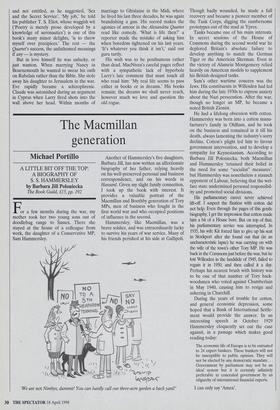The Macmillan generation
Michael Portillo
A LITTLE BIT OFF THE TOP: A BIOGRAPHY OF S. S. HAMMERSLEY by Barbara Jill Poloniecka The Book Guild, £15, pp. 192 For a few months during the war, my mother took her two young sons out of doodlebug range to Sussex. There she stayed at the house of a colleague from work, the daughter of a Conservative MP, Sam Hammersley. Another of Hammersley's five daughters, Barbara Jill, has now written an affectionate biography of her father, relying heavily on his well-preserved personal and business correspondence, and on his words in Hansard. Given my slight family connection, I took up the book with interest. It provides a valuable portrait of the Macmillan and Boothby generation of Tory MPs, men of business who fought in the first world war and who occupied positions of influence in the second.
Hammersley, like Macmillan, was a brave soldier, and was extraordinarily lucky to survive his years of war service. Many of his friends perished at his side at Gallipoli.
`We are not Nimbys, dammit! You can hardly call our three-acre garden a back yard!' Though badly wounded, he made a full recovery and became a pioneer member of the Tank Corps, digging the cumbersome prototypes out of the mud at Ypres.
Tanks became one of his main interests. In secret sessions of the House of Commons during the second world war he deplored Britain's absolute failure to develop anything to match the German Tiger or the American Sherman. Even in the victory of Alamein Montgomery relied heavily on American models to supplement his British-designed tanks.
Sam's other wartime concern was the Jews. His constituents in Willesden had led him during the late 1930s to express anxiety about the Nazi persecution. After the war, though no longer an MP, he became a noted British Zionist.
He had a lifelong obsession with cotton. Hammersley was born into a cotton manu- facturer's family in Oldham, and he took on the business and remained in it till his death, always lamenting the industry's sorry decline. Cotton's plight led him to favour government intervention, and to develop a sympathy for Keynesianism. According to Barbara Jill Poloniecka, both Macmillan and Hammersley 'retained their belief in the need for some "socialist" measures', but Hammersley was nonetheless a staunch opponent of Labour, believing that the wel- fare state undermined personal responsibil- ity and promoted social divisions.
His parliamentary career never achieved lift-off. I suspect the fixation with cotton did not help. Even through the pages of this gentle biography, I get the impression that cotton made him a bit of a House bore. But on top of that, his parliamentary service was interrupted. In 1935, his wife Kit forced him to give up his seat in Stockport after she found out that (in an uncharacteristic lapse) he was carrying on with the wife of the town's other Tory MP. He was back in the Commons just before the war, but he lost Willesden in the landslide of 1945, failed to regain it in 1950, and then called it a day. Perhaps his nearest brush with history was to be one of that number of Tory back- woodsmen who voted against Chamberlain in May 1940, causing him to resign and ushering in Churchill.
During the years of trouble for cotton, and general economic depression, some hoped that a Bank of International Settle- ment would provide the answer. In an interesting speech in October 1929 Hammersley eloquently set out the case against, in a passage which makes good reading today:
The economic life of Europe is to be entrusted to 24 expert bankers. These bankers will not be susceptible to public opinion. They will not be elected by any democratic mandate.. . Government by parliament may not be an ideal system but it is certainly infinitely preferable to concealed government by an oligarchy of international financial experts.
I can only say 'Amen'.


























































 Previous page
Previous page